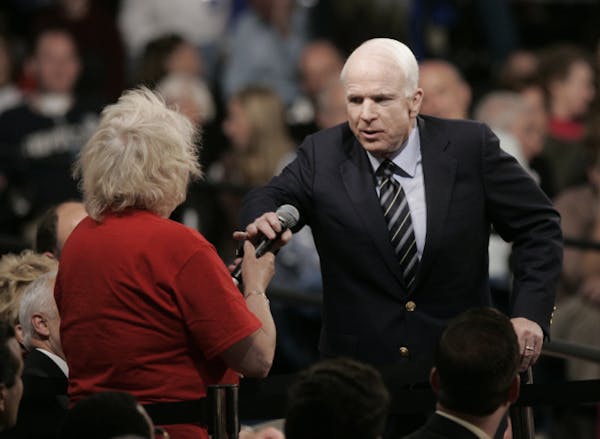In the face of the deepening financial crisis, U.S. Sen. Norm Coleman said Friday he will pull all his negative advertising from television, print and radio and disavow any interest group ads that attack his opponents.
Appearing somber at a news conference at his campaign headquarters in St. Paul, Coleman told reporters that after a day of fasting and prayer for Yom Kippur, a "time of fasting, soul-searching and refocusing on your life," he had decided to change the tone of his campaign.
"We're in a place that I don't think any of us of this generation, this time, have ever seen before," Coleman said. "At times like this, politics should not add to the negativity. It should lift people up with hope and a confident vision for the future."
Almost wryly, Coleman added that he also "decided I was not all that interested in returning to Washington for another six years based on the judgment of the voters that I was not as bad as the other guys. I want voters to vote for me and not against the other folks."
The turnaround comes amid the harshest, most costly Senate campaign in the country, in which Coleman and DFLer Al Franken have aired biting attacks on one another's character, temperament and records.
Coleman's ads and those of the National Republican Senatorial Committee have characterized Franken as angry, foul-mouthed and unfit for office. Coleman defended those ads as recently as Sunday. He did not disavow them Friday, but said no others would follow from his office.
As for attacks on him, he said, "I'll respond with my record. But I won't counterpunch."
Lately, Coleman has been slipping in polls behind Franken, and a recent Star Tribune Minnesota poll indicated the negative ads had created a backlash against the senator. While 42 percent of the poll respondents said ads critical of Coleman were "unfair personal attacks," 56 percent said that about ads aimed at Franken.
Dean Barkley, the Independence Party candidate in the Senate race, said that "I'm not going to question [Coleman's] motivation" but he noted that "this has been one of the most negative campaigns in Minnesota history" and said Coleman was trying to "unring the bell."
In a statement Friday afternoon, Franken campaign spokesman Andy Barr labeled Coleman's ad withdrawal "a cynical ploy designed to change the subject and avoid scrutiny of his own record. It's like an arsonist burning down every house in the village and then asking to be named fire chief."
Asked whether the Franken campaign would continue airing critical ads on Coleman's record, Barr said, "Senator Coleman said it [the race] should be about his record, and we agree."
Coleman's statement came hours before presidential candidate John McCain, whose own campaign ads have gone almost entirely negative, made a town hall-style campaign stop in Lakeville. Coleman did not attend, saying he was going to spend the afternoon ensuring that his negative ads went down and blocking out an intensive schedule of city-by-city campaign stops over the next three weeks.
That decision also put a little distance between Coleman and a campaign where the rhetoric had become harsher, with crowds often chanting and booing throughout rallies.
Jennifer Duffy, senior editor for the Cook Political Report in Washington, D.C., said no other Senate race in the country has taken a similar stand in response to the national economic meltdown. But she said the strategy may make sense given what Republicans are dealing with around the country.
"Rightly or wrongly, Republicans are bearing the brunt of voter anger on the economy," she said. "We are seeing a direct correlation between the kind of day the Dow has and the kind of night they [campaigns] have in tracking. We could see this in other races."
Recalling Wellstone
Coleman struck a similar tone once before, after the 2002 death of Sen. Paul Wellstone, when he temporarily suspended his campaign and, for a time, aired softer, more positive ads.
Coleman said he's taken a similar read of the public now and concluded that voters are not in the mood for character attacks or other distractions.
"The level of fear and uncertainty is beyond what I've ever seen in 32 years of public service," he said. "The consultants will not like this decision. But my reading is that people now are so anxious, so concerned, we shouldn't be feeding it."
Coleman said he had already talked to the National Republican Senatorial Committee, asking it to pull its ads as well. No one from the campaign committee returned phone calls on Friday.
Gina Countryman, spokeswoman for the Minnesota Republican Party, said the state GOP would comply with Coleman's request. While the party has not aired TV or radio ads on Coleman's behalf, it has circulated literature pieces, including one that surfaced in the western suburbs on Friday accusing Franken of writing "graphic pornography," lack of self-control and insulting comments. The Franken campaign has countered that Republicans selected bits from Franken's comedy routines over the years and used them to portray him in the most unfavorable light possible.
Countryman said that the literature piece had already been distributed by the time Coleman's request came, but that other pieces will be held back. She added, "but that applies only to the Coleman race."
Personal life 'off-limits'
At Friday's news conference, Coleman also addressed an issue that surfaced earlier this week: unconfirmed reports on the Internet that a friend, businessman Nasser Kazeminy, had bought suits for him.
Reporters' attempts to confirm the reports were rebuffed this week. On Friday, Coleman said that "Nobody but me and my wife buy my suits."
He added that "Barack Obama was right. Families should be off-limits."
Patricia Lopez 651-222-1288

